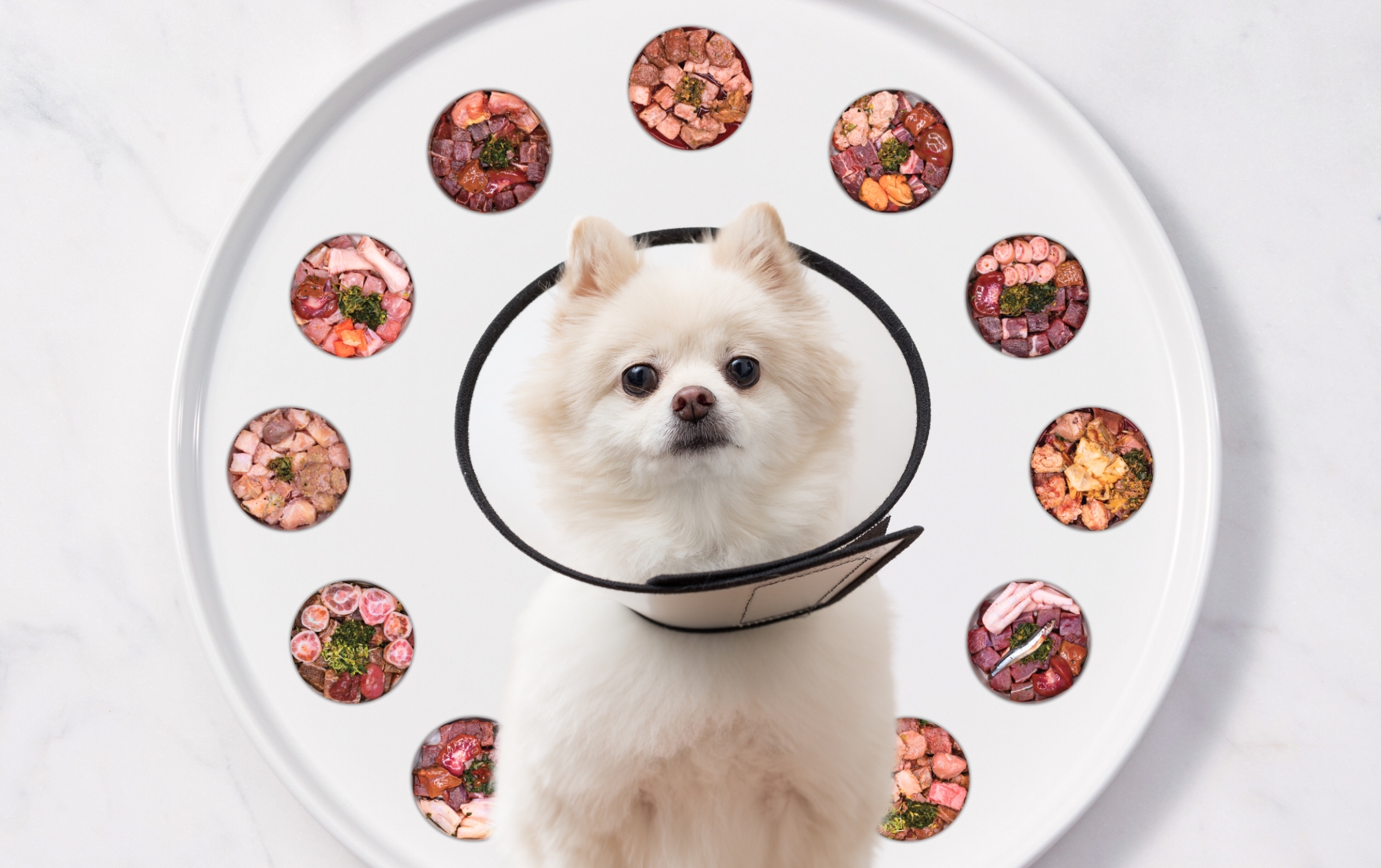
How to Choose the Right Diet for Pets Recovering from Illness or Surgery
Recovery after illness or surgery is a critical time in your pet's life and nutrition plays a major role in how quickly and effectively they heal. Just like in humans, the right diet can support tissue repair, reduce inflammation, restore energy, and strengthen the immune system.
Before tailoring a meal plan for your pet, it is essential to assess their current health status and stage of recovery. Is your pet healing from surgery such as tumour removal, recovering from a physical injury, or managing post-operative pain related to a mobility issue? Each scenario requires a different nutritional focus. For instance, pets recovering from surgery may need increased protein for tissue repair, while those with inflammation or joint issues could benefit from anti-inflammatory support. Some pets may show reduced interest in food due to medications or discomfort, making it crucial to offer highly palatable and digestible diet.
Prioritise High-Bioavailability Protein and Appropriate Healthy Fat
When supporting your pet's recovery whether from surgery, illness, or injury, prioritising high-quality, easily digestible protein is essential. Protein plays a critical role in repairing tissues, building lean muscle mass, and maintaining a strong immune response. Fresh meats, particularly those that are gently cooked (like sous vide) or raw, offer superior bioavailability compared to the highly processed proteins found in many commercial processed diets such as kibbles. These whole food proteins are more readily absorbed and utilised by the body, providing the necessary amino acids in forms your pet can use efficiently during healing.
Including healthy fats in your pet’s diet is also vital for energy, nutrient absorption, and overall wellbeing. Fats serve as a dense energy source especially beneficial for underweight, lethargic, or highly active pets that need an extra nutritional boost. However, not all fats are created equal. The quality and quantity of fat matter significantly. One of the most valuable additions is omega-3 fatty acids, commonly found in seafood such as salmon or salmon roe. These fats help reduce inflammation, support skin and coat health, and improve cognitive and joint function especially in ageing pets.
That said, it is important to strike the right balance. Excessive fat intake, particularly in pets prone to conditions like pancreatitis, can lead to serious health issues. Overfeeding fatty meats or oils without proper moderation may strain the digestive system and liver. This is why it is recommended to opt for meals with moderate fat content.
Avoid High-Carbohydrate Diets in Certain Health Conditions
In some health conditions, particularly in pets recovering from cancer or dealing with obesity-related joint issues, a high-carbohydrate diet is generally not recommended. Carbohydrates such as grains, sweet potato, and white rice, while often used as fillers in pet food, can contribute to excess calorie intake and promote inflammation when consumed in large amounts.
For cancer patients, carbohydrates may fuel tumour growth, as many types of cancer rely heavily on glucose (derived from carbohydrates) for energy. Reducing carbohydrate intake may help slow disease progression and support the body’s natural healing processes.
Likewise, in pets with joint problems linked to obesity, high-carb diets can exacerbate weight gain or hinder weight management efforts. Excess weight puts additional strain on the joints, increasing pain and limiting mobility. A low-carbohydrate, high-protein, moderate-fat diet tailored to support lean muscle mass and reduce inflammation can be more effective in promoting recovery and improving overall quality of life.
Each pet’s condition should be assessed individually, but in general, minimising starchy vegetables and grains can be a strategic dietary choice for managing these specific health concerns.
Choose Natural Nutrient Sources Over Supplements
When caring for a pet recovering from illness, the goal is to nourish their body without overwhelming it. While supplements may seem like a convenient fix, in most cases, a balanced, customised diet made from whole foods can provide all the essential nutrients your pet needs. Supplementation can be considered if there is a known deficiency or a diagnosed medical condition that warrants it and under veterinary guidance.
Offals such as liver and kidney, offered in small, controlled portions, are excellent sources of highly bioavailable vitamins and minerals. For pets in need of joint support, natural sources like chicken cartilage or beef tendon provide glucosamine and chondroitin that are crucial for rebuilding connective tissues.
These whole food options not only enhance absorption but also work in harmony with your pet’s physiology, reducing the risk of imbalances and side effects associated with oversupplementation.
Avoid Foods That May Trigger Sensitivities and Allergies
During recovery, your pet’s immune system may be in a heightened state, making them more reactive to allergens and inflammatory triggers. It is vital to avoid ingredients that could provoke food sensitivities or allergies, as these can delay healing or aggravate underlying conditions.
Feeding the wrong diet can lead to systemic inflammation, gastrointestinal upset, or flare-ups of existing symptoms. Choose ingredients your pet has previously tolerated well can help reduce immune stress and support healing.
If your pet displays any symptoms of food allergy during recovery, consider starting an elimination diet to identify potential triggers. A customised, limited-ingredient fresh diet such as one featuring a single protein source can reduce allergen exposure and offer a clearer picture of how your pet responds to food. This allows for more precise adjustments and promotes smoother recovery.
Conclusion
Every pet’s recovery journey is unique, and their diet should reflect that individuality. While general guidelines provide a helpful foundation, the most effective recovery plan is one customised to your pet’s specific needs by considering their medical condition, weight goals, lab results, and any underlying issues.
A customised fresh food diet not only allows for precision in ingredient selection but also ensures superior bioavailability, helping your pet absorb nutrients more efficiently during this crucial healing phase. When combined with appropriate rehabilitation therapies, a well-balanced diet can significantly improve recovery outcomes.
To explore customised diets that support healing and long-term well-being, visit bombom.com.
